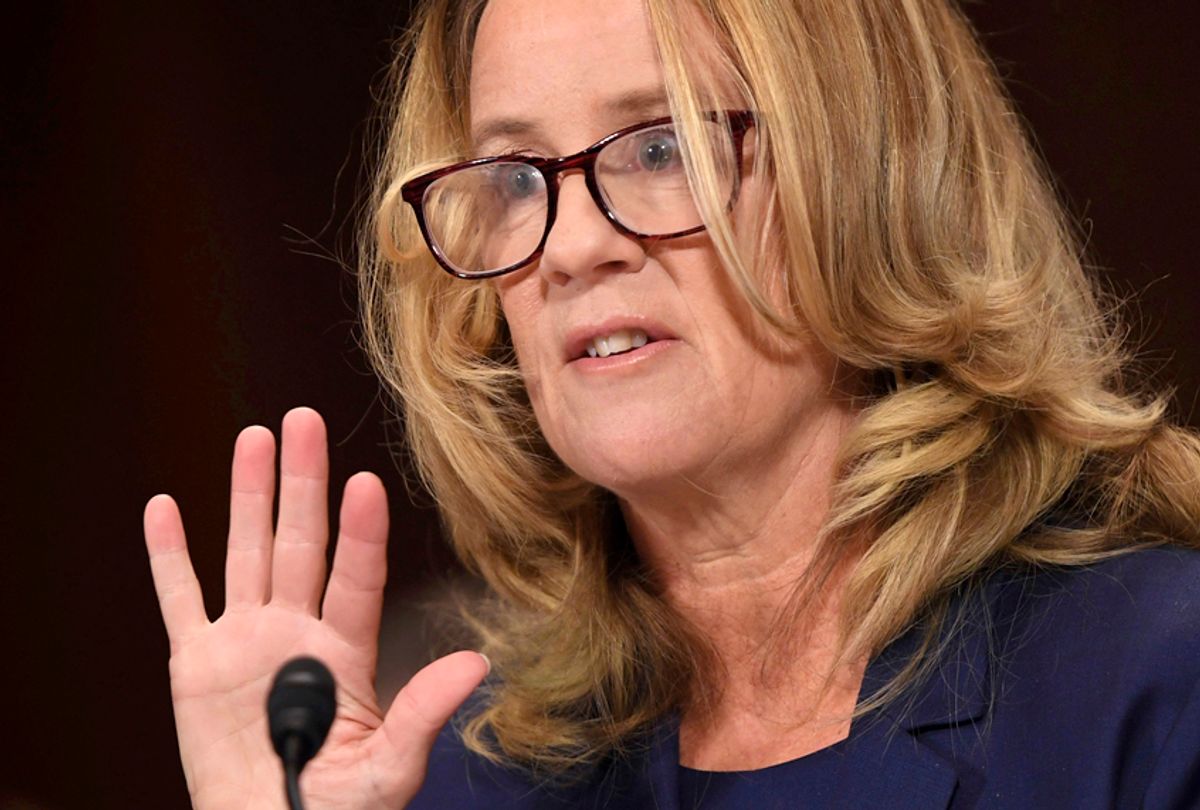At Thursday’s Senate hearing, Dr. Christine Blasey Ford described in detail the trauma she experienced since she was allegedly assaulted by Supreme Court nominee Brett Kavanaugh at a high school party in 1982.
“Brett put his hand over my mouth to stop me from screaming. This was what terrified me the most, and has had the most lasting impact on my life,” Ford said in her opening testimony. “I did my best to suppress memories of the assault because recounting the details caused me to relive the experience, and caused panic attacks and anxiety.”
Similar to the experience of grief, there are many variables at play that factor into how a person will process such a traumatic life event — such as one’s background, previous trauma, and support system. However, as any sexual assault survivor knows, trauma can take many different forms will likely almost always manifest in one way or another, days or decades later. Salon spoke to three professionals in the mental health field to explain the trauma that follows sexual assault.
Abra Poindexter — a licensed Independent Clinical Social Worker in Nebraska — told Salon she typically sees five aspects of a person’s life impacted following a sexual assault: one’s sense of safety, power, self-worth, intimacy, and ability to trust.
In her Thursday testimony, Ford described how the alleged assault “drastically altered” her life, and described feeling a threat to her safety — so much so that years later, in 2012, while she was remodeling her home with her husband, she wanted two front doors — a request her husband did not understand until she told her husband about the attack.
“In explaining why I wanted to have a second front door, I described the assault in detail,” Ford said.
Poindexter explained that one’s “sense on how to assess who is trustworthy and who is safe to trust and who is not” is completely altered after a sexual assault. Poindexter said immediately following an assault, the victim often expresses shock and denial. Clinically, Poindexter said, that is part of the brain’s response to protect a person from the trauma.
“From a clinical perspective, if you have been violated your brain’s job is to protect you from that,” she said. “Our brains are designed to process information in bits... [hence] the 'shock and denial' part, we can’t [recall] the entire experience at once, in order to function.”
As human brains don’t fully develop until age 25, teenagers and young people who experience sexual assault may take much longer to process trauma, Poindexter explained.
Kathryn Bell, an associate professor in psychology at Capital University, said Post-traumatic Stress Disorder (PTSD) is common in sexual assault survivors, as it is with many military veterans.
“The effects of sexual trauma vary greatly depending on the individual; some people are able to recover with minimal long-term psychological effects and some people may struggle for an extended period of time,” Bell told Salon. “Post-traumatic Stress Disorder is one condition that can arise after a sexual trauma, and sometimes symptoms can occur right after or there may be a delay.”
Symptoms of PTSD, Bell explained, can include recurrent nightmares about the assault, uncontrollable thoughts about the trauma, flashbacks, and hyper-vigilance. Symptoms can also look like depression, in ways where a survivor of sexual has a hard time experiencing happiness, or changes the way a survivor thinks of oneself. Chronic sleep problems can also persist.
PTSD also can have a lasting biological effect on someone who has been sexually assaulted. A paper published in The McGill Journal of Medicine (MJM), a peer-reviewed publication at McGill University’s Faculty of Medicine in Canada, stated “the prevalence of Post-traumatic Stress Disorder (PTSD) in assault survivors is drastically higher than the national prevalence of the disorder.”
“Intense psychological trauma such as sexual abuse can cause changes in the body's response to stress by increasing levels of CRH and disregulating the HPA axis,” the authors wrote.
The Hypothalamic-Pituitary-Adrenal (HPA) axis is a critical regulatory function in the body that is home to cortisol, the primary stress hormone in the body. Cortisol is released when stimulated by Corticotropin Releasing Hormone (CRH). Reduced responsiveness of cortisol can contribute to “inappropriate fear reactions and persistent mild depression.” In other words, the changes to the body that can occur from PTSD can impact the way a person handles trauma in the future.
Patricia Resick, Ph.D. and a Professor in the Department of Psychiatry and Behavioral Sciences at Duke University, explained that another key symptom of PTSD is avoidance, which can be especially prevalent when the trauma occurs at a young age. Later in life, avoidance can be displayed through achievements.
“High-functioning people with PTSD are some of the busiest people on Earth,” she told Salon. “They avoid by excelling in school and doing really well.”
Guilt and shame are also symptoms that can keep a sexual assault survivor from reporting the attack, which can sometimes stem from cultural narratives that say “good things happen to good people and bad things happen to bad people.”
“People often blame themselves because they want to believe in a just world,” Resick said. “People don’t say if you mind your own business and you behave things might or might not work out.”



Shares